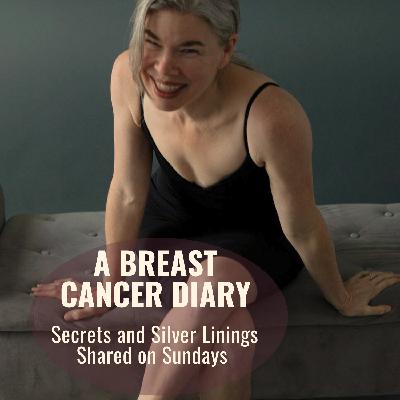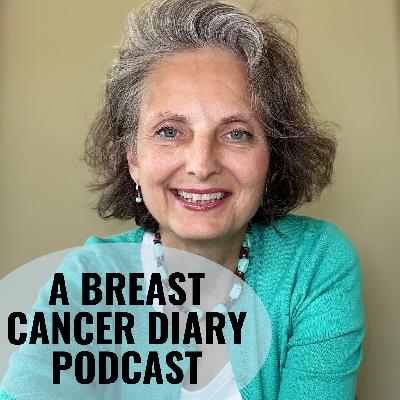My Friend Brenda, a True Survivor
Description
This and next week I'll be interviewing some friends close to home. I live in Oregon Wine Country, and there are a few breast cancer survivors who live in my part of the woods that I've gotten close to over the past two years. Brenda is one. We talk just about every week and see each other monthly. She's been through so much, and she keeps going, relying mostly on her own strength. I was thrilled to be able to hand her the mic, as we sat in my living room together to record this episode.
Transcript:
Today's my first in person interview. I have my friend Brenda Huff with me. She's a neighbor and my sidekick that I invite to all kinds of local events. We hang out together in person a lot and I thought I would have her here to my house for an interview for the podcast. And Brenda is a resident of Forest Grove, the town that's closest to where I live. And she is a former stay at home mom. Raising her kids, and she's also right now in recovery from a number of injuries and from homelessness. So she's had a bit of a rough time recently, but she's doing amazingly in recovering.
And so I, I really wanted to invite her to tell her story. She's a fellow flattie. She had stage three breast cancer, went straight to flat from a double mastectomy and, went through treatment with chemo. And did you have radiation? I can't remember. Yeah, you had radiation too. So, we live in the same community, have a lot of the same friends, and we're part of the same flat community called West Valley Flatties.
And so Brenda and I see each other a lot. And I wanted to ask her, in particular, about a part of her story that involves the early days of her being flat and being on chemo. And I think this is an important perspective because I tend to have a lot of folks on later in their journeys when they're very used to their new bodies and have, you know, adapted and are celebrating their new bodies.
But I think a lot of us, and Brenda included, have had a rough start at the beginning of kind of starting to accept the flatness and the change. And so I wanted to ask you first, Brenda, how did you decide to go flat?
B:
Um, I wasn't sure about putting implants in there if they would fail me down the road. My surgeon had said something about it and he had asked me several times if I wanted the implants and I said no. I said I think I'll just hold off and I'll just be flat.
K:
Okay, so it was kind of just your own intuition, your own feeling about what you needed. And did you have any fears about what you would look like when you first saw yourself in the mirror after that surgery?
B:
Yeah, I did. It was hard. It was really hard. But, um, sometimes I'll wear the prosthetics and then sometimes not, you know, but it's hard to go flat just for myself. And some, some of my friends that are in the flatties just go flat, you know, and they're fine with it. But me, I just still hesitant of it. So I just wear my fake ones.
K:
Yeah, no, that's that's great. I think for me, I have a fake one too because I have a small Goldilocks and then I have a little fake prosthetic that it kind of sticks on to my skin and I can wear it when I'm feeling uncomfortable and I feel like I wear it in the times when I'm feeling like all eyes are on me. Um, or maybe some eyes that I don't really know or trust maybe on me. But, um, yeah, I think it's, it's great to have that freedom to be like in your body and not putting the extra stuff on sometimes. And then on the days when you need to, then putting the extra stuff, the extra prosthetic on. I think that's awesome. And I, I think we should all feel the freedom to do that.
B:
But then I have a little joke about that too, about wearing the prosthetics. Um, mine are just made of cotton, but I've gotten out to, outside of the house to get ready to go somewhere. And I'm walking down the street and I look down and one of my prosthetics is much lower than the other one and so it's like what do you do you do you turn around and pray nobody's looking because you're playing with your boobs, you know!
K:
Oh My goodness, yeah, so I have a story about that: this Christmas I was the one that hosted here at my home and I was running around and getting a little sweaty wearing my prosthetic and it's a stick on and I don't wear a bra with it and I had never worn it when I was getting really sweaty and running around like that and sat down to eat and about like 10 bites into my meal, it fell off into my lap and like, you know, I'm looking around the table to see if anyone's noticed.
Hopefully they didn't notice anything, right? I don't think they did, but oh my goodness. That's good. One of the pitfalls of wearing a prosthetic.
B:
Very much so. We all have it when we are cancer survivors like this. So, yeah. Yeah. I mean, unless you have implants. that are, you know, inside your skin, you don't have to worry so much, but even then I think there's some lopsidedness, some asymmetry that happens for everyone. So for everyone, even people that without cancer have one breast that is smaller than the other.
K:
I've heard that. Yeah. That the majority of women have a breast. That's a little different or pointed in the wrong direction or whatever. So it's not just us, you know, it's other women out there too. Absolutely. Well, when I first met you, you shared a really poignant. Tear jerking story with me that's always kind of remained with me and um, I'm so honored that you trusted me with that story and you said that you would also trust the audience of the podcast with that, that hard story. And so I wondered if you would share that story here on the podcast.
B:
Yes, um, that was a difficult time. seen the points in this, the staring and stuff like that, but never what I experienced. I lived in Tualatin and I went into Fred Meyers to do some grocery shopping and I could overhear a lady talking to her husband on the lines of, please do not say anything to that lady.
And, um, her husband never acknowledged her and, and she just kept saying, please don't do this. Please don't embarrass me. Please don't embarrass that woman. Please just let her be, you know. And he came up to me and he said, um, and I can't remember word for word what it is, but he was really rude to the point where, um, he says, women have hair.
Why don't you have hair? You look like a male. And that really hit. It hit home pretty good. Um, that lady was very upset. She tried to apologize up one side, down the other, and there was no going back from that. Um, she left her husband in that store and walked out without him.
K:
Good. I'm glad that she did that.
B:
It's very hard because at that point I had no breasts. I had no hair. Yeah, I look like a man. I mean, it's gotten better, but You know, and a lot of the men were the ones that would point and stare, let alone the little kids. But I taught my kids, you don't point and stare. You know, but a lot of parents don't teach them that. And that's the hard part in here.
K:
Absolutely. Yeah. Thank you for sharing that. I know at that time you were really raw. You were still going through the treatment. You had no choice but to do your own grocery shopping. And so there wasn't, it wasn't like you could, you know, You know, put a prosthetic on or put a wig on, and that point you were struggling and, and struggling financially too, I imagine.
B:
Cancer is very expensive. I mean really it is because not a lot of the free wigs are out there and not a lot of the free prosthetic is out there. Um, I was very thankful for you because you were able to give me the swimmer prosthetics and those were fun and I really appreciate that very much because I really struggled with that too to even go to a pool because I have no breasts.
So that was the hard part and a lot of bathing suits require breasts in order to look presentable or whatever, but, and I still struggle with it, but I'm thankful that I got help with you and then I found out other communities and stuff out there that will help with breasts, you know, just the prosthetic ones, but yeah.
K:
So I remember when you and I first met the first day that we met and we'd been in touch a lot through Facebook and email and things like that prior because we were meeting because of the Komen walk in Portland at the zoo and you brought your own team and your team was really good at communicating with me as kind of the head of our larger team and a support group for yourself.
And you guys had made beautiful t shirts, um, I can't remember what they said, but something about supporting you, Brenda. And, um, I was just, I loved your energy and you were all dressed up in tutus and you matched and, I'll never forget, you were one of the first women I've ever seen take your shirt off in one of those breast cancer walks for the first time, and you know, experienced that novelty of sharing that intimate part of your body with the other breast cancer survivors around you.
Do you remember what that felt like on that day?
B:
It was an emotional day , you know, I mean all around it was emotional. I got to meet new people and then I just felt like I'm here with them. I might as well experience it with them and that was a tearjerker but it felt good. It felt good to be around those women that look like me, feel like me, you know.
It was good.
K:
Absolutely. I relate to that. I think I remember you saying, what the heck? And just taking your shirt off because you saw so many of us that had done so, that were a part of our team as the Oregon Flatties, I guess is what the name of our team or Stand Tall AFC was the sponsor. So you were joining us because you, you saw the solidarity already and you wanted to be a







